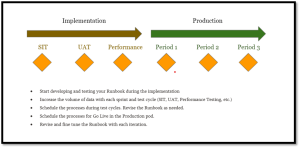Introduction/ Issue:
Oracle ERP Cloud customers have a need to close their books every period, quarter and/or year. This paper provides guidance on the period-end close procedures for Oracle Cloud Application modules, across Financials, Procurement, Projects, Inventory, and Payroll. It also seeks to give an overview of the relative timings of these procedures, and relationships, across the various modules.
Why we need to do / Cause of the issue:
Period Close Dependencies
Dependencies
- Firstly, as mentioned above this is intended to demonstrate the best practice for period end closing but individual customers may have business priorities that require alternative timings.
- Complete as much Expenses Report processing, entering and approving expenses, as possible prior to the Payables close.
- Close Payables before closing Cost Management to take into account the purchasing accruals at period end for receipts not invoiced.
- Close Payables before closing Fixed Assets to ensure invoices are completed and capital invoice line distributions are transferred from Payables to Fixed Assets.
- If creating leases in Fixed Assets, all leasing invoices must be interfaced to Payables and paid before closing Payables.
- Close Payables before closing Projects to ensure invoices and expense report charges are completed and transferred to Projects.
- Close Cost Management before closing Projects so that Project-related inventory transactions and project receipt accruals are completed & imported into Projects.
- Transfer all relevant Project costs to Fixed Assets, for potential capitalization, before closing Fixed Assets.
- Process all relevant Subledger Accounting transactions through Joint Venture to create joint venture-related Receivable invoices and Project Costing adjustments before closing Receivables and Projects.
How do we solve: Key Considerations for Establishing a Runbook
Goal oriented
All the Runbooks should be established with a specific goal in mind. For example, goal of the Runbook might be to close the subledger periods within a single day and general ledger period in next two days. A Runbook should have processes and activities in proper order for each day of close.
Detailed Content
A Runbook should have detailed information of each of the processes such as start and end time, estimated volume, days, sequencing of programs etc. so that business user community can follow the runbook step by step whenever needed. Below are the key items for designing a detailed Runbook for Oracle Cloud:
- Define a day-in-the-life processing cycle and test it before moving to Production
- Establish a detailed period close calendar and refine it with every period close cycle
- Identify the processes that can be run in advance, maybe daily or weekly, to reduce the exceptions during period close
- Run necessary reconciliations in more regular frequency instead of waiting for period close window, if possible
- Identify peak times during business days and plan resource intensive processes in non-peak hours
- Allocate specified time for business users for mutually exclusive operations; for example, users shouldn’t upload journal entries through FBDI when allocation is scheduled
- Assess and incorporate dependency in the daily and month-end processes; please refer to earlier sections of this document for understanding the dependency
- Scope/parameters of the processes, i.e., ‘Ledger’, ‘Business Unit’, ‘Journal Source’ etc., entry criteria (pre-requisite conditions to be met), exit criteria (conditions for successful completion) and exception procedures
Conclusion: Lifecycle of a Runbook – how to build one

Job Schedule
Create a logical schedule of tasks and procedures to run your system. The sample template outlines the standard Oracle jobs and procedures. Review and update the schedule according to your system configurations.
Integration Schedule
Create a logical schedule of ingestion from upstream systems and extraction to downstream systems to and from Oracle Cloud ERP respectively.
Report Schedule
Create a logical schedule with your standard and custom reports to be run in Oracle Cloud ERP.
Calendar Template
Design a calendar with a summary of key tasks and procedures to perform on a daily, weekly or monthly basis.
Validation Owners
Identify individuals or groups to own specific processes and be responsible for a timely resolution and completion.
